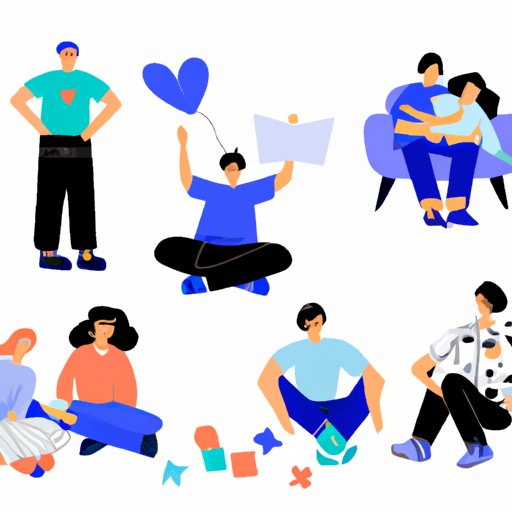
Introduction
Loneliness is an emotion that can be experienced by anyone, regardless of age, gender or status in life. It is defined as a feeling of isolation or lack of meaningful social connections. Loneliness can cause psychological and physical health problems, leading to depression, anxiety, and suicidal behavior. This article aims to offer support and guidance to those experiencing loneliness. We will discuss ten tips to overcome loneliness, how to cope with it, and provide inspiration and guidance for your journey.
10 Tips to Overcome Loneliness and Find Connection
1. Join social groups or clubs that interest you. Have you always been curious about a topic or hobby? Join a group or club that relates to that topic, and you will be surrounded by like-minded people.
2. Volunteer in your community. Volunteering is an excellent way to connect with others while giving back to your community.
3. Take up a new hobby or activity. Finding something that you enjoy doing can lead to new social connections
4. Get a pet. They are great companions that will bring joy and love to your life.
5. Attend social events and gatherings. Go to parties, community events or invite new acquaintances to meetups to broaden your social circle.
6. Connect with old friends and family members. Call or message your parents, siblings, or long-lost friends for a catch-up session.
7. Pursue online or virtual relationships. There are many social media groups that you can join to connect with people that share your interests.
8. Seek professional help or support groups. A mental health professional or support group can provide you with the necessary tools to manage loneliness and develop meaningful relationships.
9. Learn to be comfortable alone and practice self-care. Spending time alone can be scary, but it can also help you discover new things about yourself. Take up activities and hobbies that you enjoy doing alone, like reading, journaling, or taking walks outside. Self-care practices like meditation, exercise, or journaling can help cope with loneliness.
10. Stay positive and have patience. Building meaningful relationships takes time and effort. Stay positive and keep trying to connect with others, even if it seems hard sometimes.
Why Loneliness Affects us and How to Cope
Loneliness affects us psychologically and physically. It can lead to depression, anxiety, and a weak immune system. Coping mechanisms include mindfulness, exercise, mental health counseling, and medication. By practicing mindfulness, we become more aware of our feelings and thoughts concerning loneliness. Exercise releases endorphins that help elevate mood and can reduce the physiological effects of stress. Mental health counseling and medication can provide guidance and tools for coping with negative emotions.
A Guide to Making Friends as an Adult
Making friends as an adult can be tricky, but it’s doable. Tips include attending local events, trying new activities, enrolling in a class, speaking to your neighbors, going out for dinner, joining a social group, or using apps like Bumble BFF. Remember, making friends requires being open, genuine, and willing to listen to others.
From Loneliness to Resilience: A Personal Journey
Overcoming loneliness can be a challenging journey, but a personal story of resilience can provide inspiration. For example, someone may have joined a social group and developed meaningful relationships that helped maintain a positive mood. Another person may have found a furry friend to keep them company and give them a sense of purpose. Personal stories can be a reminder that when overcoming loneliness, there is no one size fits all approach, but it’s possible to reach a point of resilience.
The Science of Connection: Why Humans Need Each Other
The impact of social connections on mental and physical health is an ongoing area of research. Studies have found that social connections can help bolster the immune system and reduce inflammation markers in the body. Social connections also provide a sense of safety and security, leading to a happier and more positive life. To improve social connections, try to reach out to people, participate in group activities, seek therapy, and practice gratitude and kindness.
Conclusion
Loneliness affects many people, but it’s possible to overcome it with patience and effort. This article provided ten tips to overcome loneliness, how to cope with it, how to make friends as an adult, inspirational stories of resilience, and the science of human connection. It’s important to remember that loneliness is not a sign of weakness, but rather a part of being human. Let’s take one step at a time and work towards building meaningful relationships and a happier life.




